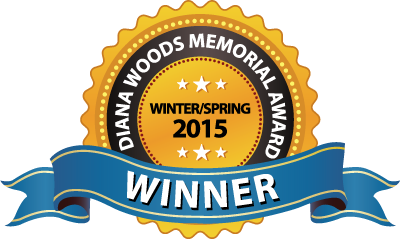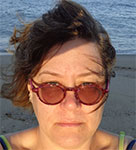Dad Died
When I was little, Dad would get into the car and say, “Let’s get lost.”
“OK,” I’d shout. “Let’s get lost.”
At each intersection he’d ask, “Which way?” until we didn’t know where we were anymore.
“Look,” I’d tell Mom when we banged into the breakfast room later. “Dad bought me a diary with a lock and key,” or “We threw stones in a river from the bridge.”
* * *
“Dad died,” my sister said over the phone, crying. “Dad just died.”
I walked out to tell the guests at our picnic table. “My dad just died,” I said.
I didn’t leave right away. What was the hurry? Dad had died. It was over. I sat for a few minutes with my husband and friends. We made a toast to him. I listened to the wind rustling the maple leaves and the guy mowing his lawn across the street and the blood rustling around in my ears. August. It was August.
Then I left to travel the 53 miles from our house, across the Tappan Zee Bridge and up the winding road to my childhood home, to Mom and Dad’s.
“Do you want me to go with you?” my husband asked.
“No.” I wanted to be alone to cross the Hudson River, to go from when my dad had been alive to the rest of my life.
I drove carefully, mulling over the sentence, “Dad died.”
Dad died. So many ds. Were they plosives? I moved my lips and said it out loud. “Dad died,” and the ds made bursts of air like small, gentle explosions from a cannon filled with confetti. Yes, plosives. Dad died—the d’s soft as pillows, just t’s really, wrapped up in spider webs. Dad died. He died.
Dad. A palindrome—he would have loved that. Dad died. Such a compact sentence—subject, verb, period. A sentence I had never said before that would be true forever now. Dad died.
* * *
Dad had been hoping to die since before the nursing home, and why not? He was unable to stand or walk, unable to feed himself, unable to read. For the final few months, the first thing he’d say upon waking in the morning was, “Oh shit, I’m still alive.” No kidding.
He had a dream. “I was trying to sign the check but no one would give me a pen.”
“Sign the check?” I’d ask.
“A check to let me die.”
“Oh, how frustrating.”
“Horrible,” he said. “Just horrible.”
While Dad was in the nursing home, I worried about him being safe. I pitied him this rotten ending. At night I’d wonder if he was scared or lonely. I didn’t want to be there with him, but I didn’t want to be anywhere else—there was not a moment’s peace for anyone who loved him.
Still, his death was a surprise. When one’s father dies, it’s always a surprise.
* * *
As I inched up to the tollbooth on the Tappan Zee Bridge, I wanted to tell the toll collector what had happened. Shouldn’t he know? Shouldn’t people be told that everything had changed? I wanted to hand him my five singles and say, “Dad died,” look into his eyes for a moment and then drive off, having delivered the sad news.
Instead I was robotic. “Thank you,” I said. He took my money without looking up.
* * *
The youngest of four kids, I was the neurotic one. An insomniac by seven years old, I would fill my bed with books so that when I awoke in the night to a silent house I’d have company. One night, as I lay working my way through Harriet the Spy (a book Dad had bought me for a nickel at a yard sale), there was a tap on the door. “Are you awake?” Dad whispered.
“Yes,” I whispered back. “Come in.”
He opened the door. “I couldn’t sleep,” he had a haggard look on his face. He was an insomniac too, and a reader, and neurotic. “I saw your light on. Want a cheese sandwich?”
We crept downstairs and sat together at the kitchen table in our pajamas, eating cheese sandwiches, two friends who had found one another in the massive, lonely ocean of insomnia.
Later, as the sky was going from black to dark blue, I climbed into my bed, turned the light off, and fell asleep, the crumbling, five-cent copy of Harriet in my sweaty hand.
* * *
When he had still been mostly well, we liked to carry our lunch into Bryant Park and sit under the plane trees with strangers. We’d listen to the live piano music. He was a New Yorker, Dad was, but he couldn’t walk far anymore, couldn’t remember simple things, like where his coat was, so we would take the elevator down and cross 40th Street right into the park, like it was ours, like it was filled with our guests. He’d smile at the music. He’d reach for my arm and say, “Isn’t this magic?”
People die slowly, I understood much later. They don’t die in an instant like they do in the movies. It happens in the most infinitesimal steps—in tiny, imperceptible stages. He was beginning to die even then, although I only realized it afterwards.
* * *
He stopped making much sense in the final months, the line between reality and hallucinations blurring. “There’s a man in a field,” he said to me one day. “He’s standing with his legs apart, his hands on his hips. He’s shouting.”
“Is he friendly?” I asked.
“Oh yes. He’s shouting for me to come with him.” He closed his eyes and I thought he might be falling asleep. Then, in a thin, wobbly voice, he began to sing without opening his eyes, stanza after stanza after stanza of a song I’d never heard.
I kept still. If I interrupted, he’d lose his train of thought.
I felt the sun beating down on our clasped-together hands.
“I can’t remember the rest,” he said and we opened our eyes. “Why are you crying?” he asked. He mimicked my expression of sorrow because it was what lay in front of him, knitting his eyebrows together like mine, his eyes tearing-up.
“Nothing’s wrong, Dad. It’s just nice to hear you sing.”
He began to pick imaginary threads from his shirt and hand them to me. I took a few and then told him, “You can drop the rest on the floor. The nurses will sweep them up.”
“That wouldn’t be right,” he said, “to throw them on the floor for someone else to clean.”
* * *
After the Tappan Zee Bridge, I took back roads the rest of the way; roads Dad and I had biked once. I felt like my heart was wrapped in a thousand blankets beating somewhere outside of my body.
I knew that the moment one’s father died was something a kid owned. It was mine. I owned his death. I was aware, from somewhere outside of myself, that I was in the middle of a rite of passage, something whose effect I would only later understand, and only maybe, even then.
I drove past neighbors’ houses, but those neighbors hadn’t lived in those houses for decades: Mrs. Whitfield’s house, the Rowells, the Giovincos, the Sloans. Everyone I knew was gone. People I didn’t know lived there now. I turned on the radio and then turned it off. Everything but my heartbeat distracted me.
* * *
He hadn’t always been perfect. I had hated him for saying mean things to my sister when she was trying to learn her multiplication tables. He was bossy and moody and unpredictable, but later on he asked me over and over again to forgive him. By then I had my own life, and he had mellowed and I wasn’t mad at him anymore. We were friends by the time he began to apologize.
A few weeks before he died, I told him, “I think about you here and I hope you’re ok. I think of you all the time.” He sat there a minute. I couldn’t tell if he had understood me.
He leaned forward the tiny bit that he was able. “It’s time,” he said, “for you to stop thinking about me.”
“I don’t want to stop thinking about you,” I said.
“I should have been dead a long time ago. It’s time you stopped thinking about me now.” He nodded and closed his eyes. I knew he was right. I needed to stay in the land of the living. He was going one place, and I was going someplace else.
* * *
I drove in second gear past the nature center where we used to sing Christmas carols with neighbors. That memory hurt, like it was a kite tied to my ribcage, tugging at me, pulling me backwards toward a suffocating nostalgia.
I drove along Spring Valley. The road was so narrow that the August vines seemed to be reaching for my car, trying to yank me into the past.
I turned up the road to Mom and Dad’s house, which I realized was now just Mom’s. As I neared it, the feeling of being pulled back and back by the vines and the kite in the strong wind of the August afternoon intensified.
Dad died, I thought, and my desire to be a child again welled up with such force that I felt the kite string strain and then snap, the freed kite lofting up and up into the windy blue sky. The vines seemed to retract as I pulled into Mom’s driveway, feeling myself re-enter my body. I turned off the car and sat there, thinking about getting lost with Dad decades earlier. Getting lost then had not been scary. Getting lost, if handled correctly, could be a good thing.






